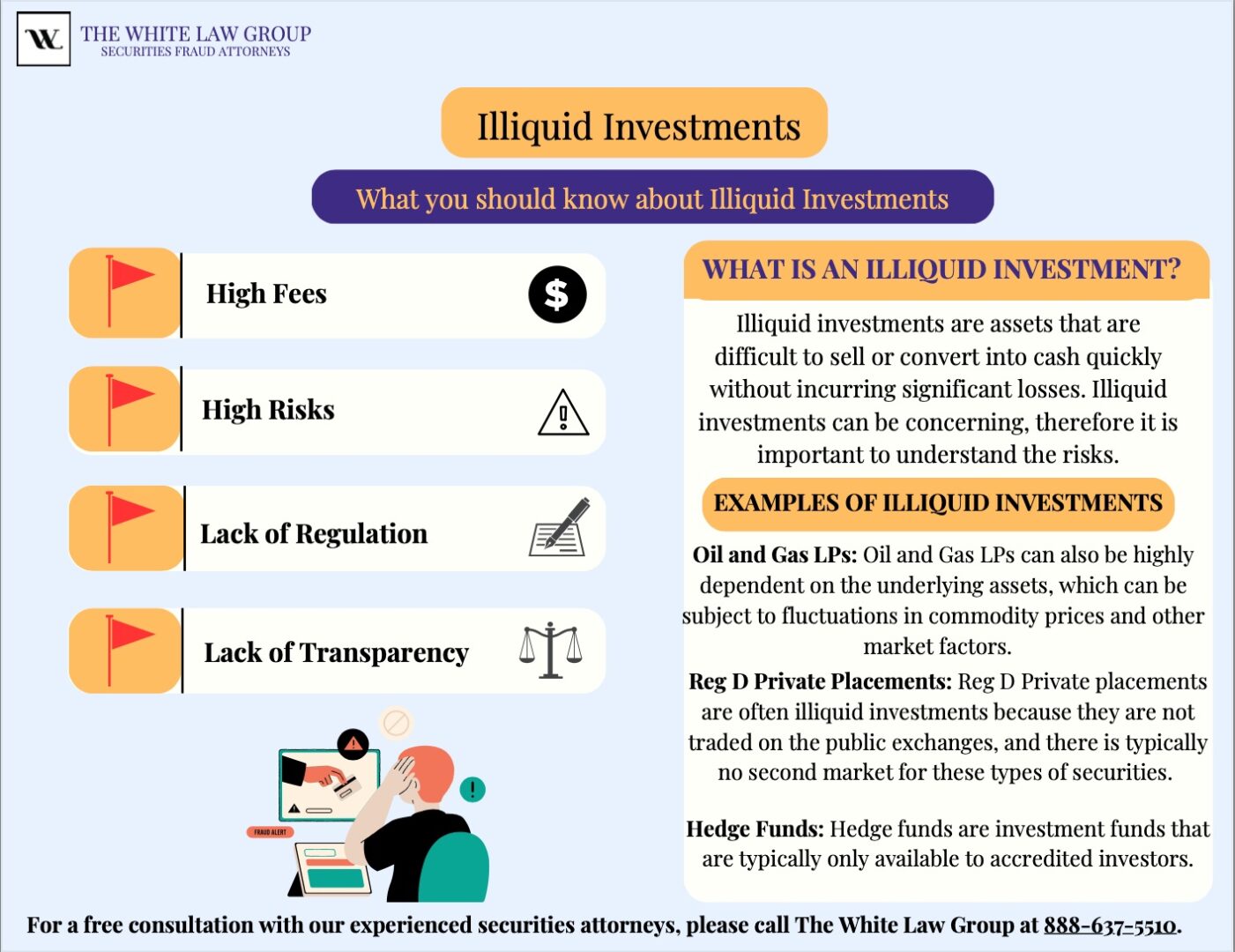What Are Illiquid Investments?
Illiquid investments are assets that are difficult to sell or convert into cash quickly without incurring significant losses. These types of investments can be concerning for a few reasons. They are ultimately associated with higher risk, as they may be subject to market conditions or other factors impacting their value. As a result, investors should carefully consider and weigh the benefits and risks before making any investment decisions.
Examples of Illiquid Investments

Oil and Gas LPs: Oil and Gas LPs are illiquid because they are often structured as limited partnerships, which means that investors cannot sell their shares without the general public’s approval. Oil and Gas LPs can also be highly dependent on the underlying assets that are difficult to sell, which can be subject to fluctuations in commodity prices and other market factors. This can make it difficult to accurately assess the value of an investment, further reducing liquidity.
Reg D Private Placements: Regulation D private placements are securities offerings exempt from registration with the Securities and Exchange Commission. (SEC) under certain conditions. These offerings are typically limited to accredited investors or entities that meet specific financial criteria. Reg D Private placements are often examples of illiquid investments because they are not tradable on the public exchanges, and there is typically no second market for these types of securities.
Non-Traded REITs: Non-traded REITs are real estate investment trusts not publicly tradable on stock exchanges. Unlike publicly traded REITs, which can be bought and sold like stocks, non-traded REITs are sold through private placements and have limited liquidity options. Investors in non-traded REITs may have difficulty selling their shares quickly and may be subject to lock-up periods or redemption restrictions. The lack of an active secondary market can make non-traded REITs illiquid and potentially challenging to exit the investment before its maturity or a liquidity event, which can be several years or more.
Non-Traded BDCs: Business Development Companies (BDCs) are closed-end investment companies primarily investing in small and mid-sized businesses. Like non-traded REITs, non-traded BDCs are not traded on public exchanges. Investors in non-traded BDCs may face limited opportunities to sell their shares, and redemption plans may have specific limitations, making the investment illiquid.
Structured Notes: These investments are complex investment products created by combining a debt component with derivative securities. They often have features tied to the performance of an underlying asset or index. Structured notes can have various terms and maturities, and the secondary market for them can be limited or non-existent. As a result, investors may find it challenging to sell structured notes before their maturity date, making them assets that are difficult to sell.
Hedge Funds: Hedge funds are investment funds typically only available to accredited investors. They are often less liquid than other types of investments and have restrictions on when investors may withdraw their funds.
Venture Capital: Venture capital investments involve investing in early-stage companies that are not yet profitable. These investments can be highly risky and may take years to generate a return. Additionally, venture capital investments are less liquid and may not be a ready market for the shares.
1031 DSTs (Delaware Statutory Trust) – A 1031 DST investment involves utilizing a provision in the tax code (Section 1031) to defer capital gains taxes on the sale of investment property by reinvesting the proceeds into a Delaware Statutory Trust (DST) that holds real estate assets. Investors exchange their relinquished property for a fractional ownership interest in the DST, allowing them to defer taxes until they sell their interest in the trust. A 1031 DST is typically considered an example of an illiquid investment.
Once an investor exchanges their relinquished property for a fractional ownership interest in the DST, it can be challenging to sell or liquidate that interest quickly. Unlike publicly traded assets such as stocks or bonds, DST interests are not freely tradable on an exchange, and finding a buyer for these difficult-to-sell assets can take time.
A TIC, or Tenant in Common investment, also falls under illiquid investments. Investors who participate in a TIC arrangement own a fractional interest in a property and with other investors. Like 1031 DST investments, TIC investments lack liquidity because they are not easy to trade on public exchanges. Selling a TIC interest often requires finding a buyer, which can take time and may result in selling at a discount. Therefore, investors should know that TIC investments are generally illiquid and may tie up their capital for an extended period.
These illiquid investments typically require a longer holding period and are associated with higher risk and potential returns. Due to their lack of liquidity, they are generally not suitable for investors who need access to their money in the short term.
Cautionary Signs of Illiquid Investments
Here are some cautionary signs to watch out for when considering assets that are difficult to sell:
Lack of Transparency: If an investment is opaque or difficult to understand, it may be a red flag. Investors should be able to understand the risks and potential rewards associated with any investment they are considering.
High Fees: High fees are another cautionary sign of an illiquid investment, which can eat into your returns. It’s essential to consider the fees before investing carefully.
High Risk: Illiquid investments are often associated with higher risk than liquid investments. Before investing in an illiquid asset, consult with a trusted family member or advisor to review the pros and cons of these investments.
Lack of Regulation: Some assets that are difficult to sell may be unregulated or subject to less oversight than other investments. This lack of oversight can increase the risk of fraud or other types of misconduct. By remaining vigilant and seeking accurate information, investors can help protect themselves against the cautionary signs of illiquid investments.
Suitability Checklist for Illiquid Investments
Your financial advisor should only recommend investments that are suitable for you. The financial advisor should conduct a suitability analysis on a holistic level. Liquidity needs, time horizon, risk tolerance, age, and income are just a few categories an advisor should take into account before recommending any investment. Once that is complete, the brokerage firm must ensure it completes due diligence at every level of each investment.
Additionally, your advisor must provide documents that are easy to understand and complete. If questions arise, an advisor should be able to answer your inquiries fully. When these rules aren’t followed, a broker or advisor risks making financial recommendations to their clients without full disclosure.
Can a Securities Fraud Attorney Help with Illiquid Investments?
A securities fraud attorney can help investors who have been victims of fraud or other misconduct related to hard-to-sell investments. They can assist with investigating the investment and determining whether fraud or misconduct occurred. A securities fraud attorney can also help guide you through the legal options you have, and they can also represent you in a FINRA arbitration investigation.
Plus, attorneys can evaluate whether your broker failed to disclose vital information, such as an investment’s illiquid nature, performance risks, and other relevant information used to form the basis of a legal claim.
What is FINRA Arbitration and How Does it Work?
FINRA is responsible for overseeing brokerage firms’ activities and enforcing rules and regulations related to the trading of securities. Seeking restitution through FINRA arbitration can be a helpful process if you feel as though you’ve been defrauded by examples of illiquid investments. Once you’ve retained a securities fraud attorney, filing a claim through FINRA could take place.
This claim should include a description of the fraud, the amount of money lost, and any supporting documentation. Once you file your claim, FINRA will appoint an arbitrator to hear the case. The arbitrator is responsible for reviewing the evidence and deciding whether the investor is entitled to restitution.
If the arbitrator rules in favor of the investor, they will issue an award for damages, which you use to seek restitution from the person or company that defrauded the investor. There is also the possibility of a settlement.
What option is best? Typically, FINRA arbitration is faster and less expensive than litigating matters.
Frequently Asked Questions (FAQs)

Why Are Illiquid Investments So Risky?
Most investors are used to the option of selling an investment before it loses too much value. That’s not the case with non-liquid assets. Instead of tapping the “Sell Now” button on your favorite trading app, you may find yourself waiting for a trading event or taking a staggering loss to sell anything illiquid.
How Can I Stop Making Poor Investment Decisions That Involve Illiquid Investments?
Completing your due diligence as an investor is the best way to avoid making poor decisions. Researching an asset’s liquidity and reviewing offering documents thoroughly can help you recognize the cautionary signs of illiquid investments. Having a qualified financial professional review your investments is also worth considering to help with future decisions.
What Is a Suitability Checklist and Why Is It Important?
This type of checklist is a vital tool. Financial experts use it to ensure their recommendations align with their clients’ investment-related profiles. Having so much information available about investors helps ensure advisors avoid a lack of transparency when working with their clients.
Free Consultation with a Securities Fraud Attorney
The White Law Group’s FINRA arbitration attorneys have handled over 700 FINRA arbitration claims involving unauthorized trading, unsuitable investments, fraud, negligence, churning/excessive trading, and improper use of margin. The White Law Group, LLC is a national securities fraud, securities arbitration, investor protection, and securities regulation/compliance law firm with offices in Chicago, Illinois, and Seattle, Washington.
If you are concerned about your illiquid investments, we can help. To schedule a free consultation with a securities attorney, please call the firm’s office at 888-637-5510.
For information on The White Law Group and its representation of investors in broker negligence claims, visit https://whitesecuritieslaw.com.
Last modified: December 22, 2025
